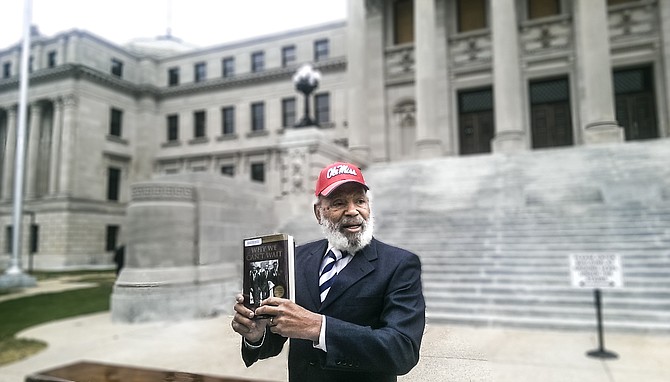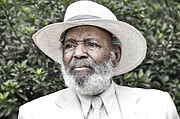James Meredith recently spoke outside the state Capitol about what he calls his "divine responsibility" and his "mission from God," which is also the title of his 2012 memoir. Photo by R.L. Nave.
It shouldn't be surprising that James Meredith, whose life and activism is the subject of a whole corner at the National Civil Rights Museum in Memphis, has a plan to fix problems in his home state. The plan is a unique mixture of respectability politicking among the African American community—while refusing to let white supremacy off the hook.
Meredith recently spoke outside the state Capitol about what he calls his "divine responsibility" and his "mission from God," which is also the title of his 2012 memoir.
In a letter he sent to Mississippi lawmakers, Meredith, 81, wrote: "In 1960, after nine years in the desegregated military, I came back to Mississippi with a plan to destroy the system of White supremacy. Today, 55 years later, in Mississippi, we have a moral breakdown in the black family, in the black neighborhood, in the black community and especially in our public education system."
Meredith's remarks came moments before the state Senate would debate a proposed alternative amendment on a statewide ballot initiative that would require the Legislature to adequately fund public schools. The initiative drew 200,000 signatures of support from around the state. Because public-education funding through the formula known as the Mississippi Adequate Education Program, is a perennial political hot potato, Republicans who criticize MAEP led the charge to place an alternative question on the ballot and get it passed quickly through the legislative process.
"That ain't nothing but another slick Mississippi trick and anybody (who will) fall for it ought be out of their mind," Meredith told the Jackson Free Press about the alternative proposed amendment.
Meredith added that Mississippi has the "smartest lawyers that have ever (existed) in the world," based on what he characterized as the state's long history of avoiding public-school integration.
There was, of course, Meredith's own integration at the University of Mississippi in 1962, which touched off a deadly riot that required National Guard intervention. Eight years later, a federal appeals court stepped in to force Mississippi to integrate its schools, which spurred the establishment and growth of private all-white academies throughout the state.
"Everybody think(s) the best private school systems in the world is in Massachusetts. I guarantee you it's in Mississippi—and everybody's still lying and pretending like we got integration," said Meredith, who in 2013 received honors from the Harvard Graduate School of Education.
Nevertheless, Meredith believes African Americans in Mississippi can counteract some of the effects of white supremacy with what he calls a return to black Christian principles.
He outlined what blacks can do in the rest of his letter as follows:
WHEN THINGS FALL APART - HOW TO PUT THEM BACK TOGETHER AGAIN.
- "PREVENTION" IS BETTER THAN "CURE." "An ounce of prevention is worth a pound of cure."
- "It takes the whole village to raise a child."
- "You should train up a child in the way he should go, and when he is old he will not depart from it."
- GOD'S PLAN - The way to teach a child Right and Wrong, Good and Bad, and how to apply these principles to life, is to teach every child the Ten Commandments and the Golden Rule between birth and the age of six.
- The Black Church in Mississippi is the answer.
- Every Black in the State of Mississippi lives within walking distance of a black Church.
- Every Black Church in Mississippi Should take Responsibility for finding every child living within two miles of their church and teach them the Ten Commandments and the Golden Rule by age 6.
- Every Black elder and church official should ask themselves every day the two questions:
- Is the Black Church fulfilling its Mission?
- Are Black Christians following the teachings of Jesus Christ?




Comments
Use the comment form below to begin a discussion about this content.